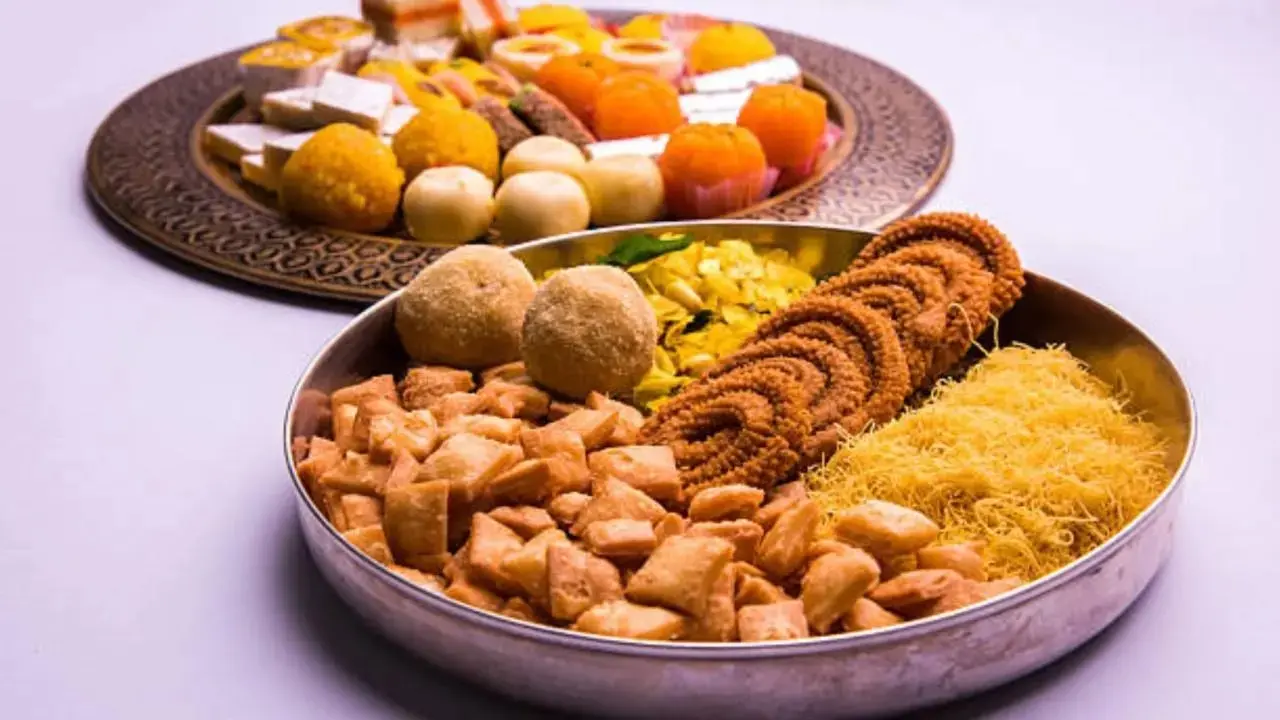The festive season is a time of joy, family, and, for many, delicious food. But amid the celebrations, it`s easy to feel overwhelmed by the abundance of sweets and rich dishes, leading to guilt and discomfort.
This guide, featuring insights from leading nutrition experts, is designed to help you navigate the holiday season with confidence. You don`t have to choose between celebrating and feeling good.
Experts outline how to enjoy traditional treats and lavish feasts mindfully, with practical tips on everything from portion control and healthy food swaps to staying hydrated and active. By adopting a few simple strategies, you can indulge in the spirit of the season without compromising your health, ensuring your holidays are truly guilt-free.
Navigating festive meals: Mistakes to avoid
The holiday season is a time for celebration, but it often comes with a minefield of overindulgence. Navigating festive meals requires a conscious effort to steer clear of common nutritional mistakes. Clinical nutritionist Dipshi Raj outlines common choices people make during festive meals that can lead to overindulgence:
Overindulging in sugar with the hope of ‘detoxing’ later: Bingeing on sweets thinking a crash diet will undo the damage often backfires. Harsh detoxes stress the body. Instead, savour treats in moderation and pair them with fibre, protein, and fluids to balance blood sugar.
Pairing sugary drinks with fried or sweet foods: Colas, mocktails, or sweetened juices add a double sugar-fat load when paired with mithai or fried items, stressing digestion and blood sugar. Swap this with water, buttermilk, or infused water.
Relying on one heavy festive meal: Skipping meals to ‘save calories’ often leads to overeating and sluggishness. Eating small, balanced meals throughout the day prevents bingeing and stabilises energy.
Believing fruit juices can ‘fix’ indulgence: Even fresh juices are high in sugar and lack fibre. Relying on them post-feast adds calories. Whole fruits are smarter—they provide fibre, satiety, and nutrients without a sugar spike.
Underestimating hidden calories: Ghee, sugar syrups, creams, and oils sneak into festive recipes. Being mindful of these hidden calories helps enjoy favourites in sensible portions.
Late-night heavy eating: Eating rich food just before bed disrupts digestion and sleep. Finish your main meal 2 to 3 hours before bedtime.
Filling up on starters and desserts instead of balanced meals: Starters and sweets seem lighter but are calorie-dense and nutrient-poor. Prioritise a balanced plate with vegetables, lean proteins, and grains before reaching for fried snacks or mithai.
The art of mindful eating and portion control
When it comes to festive feasts, a key strategy is to practice mindful eating, which involves slowing down and truly enjoying your food. According to Fiona Sampat, clinical dietitian at Kokilaben Dhirubhai Ambani Hospital, Mumbai, “You should take smaller portions of the indulgent foods whilst savouring each bite. Chewing your food properly also gives your brain time to register fullness, which takes about 20 minutes.”
A practical way to manage your intake is to structure your plate. Raj suggests starting with soup or salad before moving on to mains to fill up on fibre and nutrients first. Sampat recommends a ‘balance board’ approach, “Fill half your plate with vegetables or salad (ideally, lightly dressed), one-quarter with protein (like lean meat, paneer, or pulses), and the last quarter with a whole grain like brown rice or millet rotis. This combination of fibre, protein, and complex carbohydrates helps you feel full and prevents you from overeating sweets and fried foods,” she suggests.
Strategic food and drink pairings for better digestion
What you pair your food with is just as important as how much you eat. To aid digestion and prevent blood sugar spikes, Sampat advises pairing fibre and protein-rich foods with a moderate amount of carbohydrates. She suggests, “Eat roasted vegetables with lean meats or paneer. You can also include fermented foods like yogurt or buttermilk to assist with digestion and gut health.”
When it comes to drinks, both experts agree that it`s crucial to swap sugary beverages for healthier options. Raj points out, “Soft drinks and sweetened juices add a double sugar-fat load when paired with fried foods.” Instead, she recommends choosing water, buttermilk, or infused water. Sampat adds, “Warm water or herbal teas like ginger or peppermint are more digestible than aerated drinks.”
Healthy swaps without sacrificing flavour
You don`t have to sacrifice flavour to eat healthy during the holidays. By making some simple ingredient swaps, you can enjoy traditional dishes with a healthier twist. Sampat suggests these swaps:
1. Swap refined flour with whole wheat or millet flour: Use these for rotis, puris, or baking to increase fibre and lower the glycemic load.
2. Swap sugar syrup with jaggery, dates, or figs: These natural sweeteners can be used in sweets like laddoos or barfis for a more nutrient-dense option.
3. Swap full-fat cream Greek yogurt or hung curd: This is a great swap for dips and gravies to boost protein and reduce saturated fat.
4. Swap fried snacks with air-fried or oven-roasted versions: Dishes like chakli or samosas can be made in an air fryer to get a similar crispy texture with significantly less oil.
5. Swap heavy gravies with cream with tomato, onion, or cashew-based gravies: These bases provide richness without being too heavy.
6. Swap excess butter/ghee with cold-pressed oils in moderation: Swapping to oils like mustard or coconut in moderation offers a better fatty acid profile.
7. Swap sugary beverages with infused water, coconut water, or spiced buttermilk: These provide hydration and electrolytes without the added sugar.
Sustaining energy all day during celebrations
Sustaining your energy through a day of festive celebrations is all about making mindful choices. From morning cooking to late-night gatherings, festivals demand stamina. If you find yourself exhausted with low energy levels, it might be due to lack of proper nourishment.
To avoid crashes, Raj offers these tips:
1. Don’t rely on sugary drinks: Colas and juices give highs but cause crashes. Whole fruits or infused water are better.
2. Prioritise protein: Paneer, pulses, yogurt, or lean meat at every meal stabilizes blood sugar.
3. Snack smart: Pick nuts, fruit, yogurt, or salads instead of fried foods.
4. Keep moving: Short walks between chatting or serving food aid circulation.
5. Eat in planned portions: Space meals rather than having one heavy plate.
6. Keep fluids flowing: Dehydration causes fatigue. Sip water, buttermilk, or infused water regularly.
Binge drinking versus moderate drinking
Binge drinking involves consuming a large amount of alcohol in a short period, which overwhelms the body and leads to negative health consequences. In contrast, moderate drinking focuses on slow sips and spacing out drinks, allowing the body to process alcohol safely and reducing adverse effects.
Alcohol often accompanies celebrations, but how you drink matters. Raj outlines the difference between binge and moderate drinking to help you make informed decisions this festive season.
Binge drinking
Several drinks in a short span overwhelm the liver, which processes only one standard drink per hour. It causes dehydration, bloating, and disturbed sleep. Adds “empty calories,” especially from beer and cocktails. It also causes blood sugar spikes and crashes, leaving you drained the next day.
Moderate drinking
1. Involves sipping slowly, spacing drinks 30 to 60 minutes apart.
2. Choose spirits like whiskey, vodka, or gin with water/soda instead of sugary cocktails.
3. Paired with food, especially proteins, to slow absorption.
4. Hydrate between drinks to support the liver and reduce hangovers.
Smart festive drinking tips
1. Sip slowly and avoid mixing alcohol types.
2. Dilute with water or soda, not soft drinks, juices, or sweetened beverages.
3. Never drink on an empty stomach.
4. Flavour drinks naturally with lime, herbs, or fruit slices.
5. Alternate each drink with a glass of water.
6. Never drink in the morning to break a hangover.
Navigating holiday parties
Going to a party where you aren`t in control of the menu can be a challenge, but with a little planning, you can make smart choices. Sampat suggests, “Having a light, protein-packed snack like a handful of nuts or fruit with yogurt before you leave to prevent arriving ravenous. Once there, scope out the available food and choose dishes that are grilled, roasted, or steamed over deep-fried options. You could also bring a nutrient-dense food contribution of your own to ensure at least one healthy option is available.”
Rest and recovery
During and after the festive season, it`s important to make sure your body gets time to rest and recover. Getting adequate sleep and managing stress are key to maintaining your health goals and preventing overindulgence. As Sampat notes, “This pre-planning ensures you are mentally prepared to make healthier choices.”
Recovering from overindulgence the right way
After a rich day, avoid punishing your body with crash diets. As Raj advises, a harsh detox stresses the body. Instead, focus on a gentle recovery:
1. Hydration first: With water, herbal teas, or buttermilk to flush out excess salt and sugar.
2. Include probiotics: Like curd to restore gut balance and reduce bloating.
3. Limit caffeine: Excess tea or coffee worsens dehydration; herbal teas are better.
4. Stay active: With light activities like a brisk walk to boost circulation and metabolism.
5. Eat lighter in the evening: As metabolism slows at night, keep dinner light and portion controlled.
6. Opt for a gentle detox: For 2 to 3 days, include fruits, vegetables, and light proteins like paneer or legumes under supervision. Pair with hydration and micronutrients to reset digestion.











